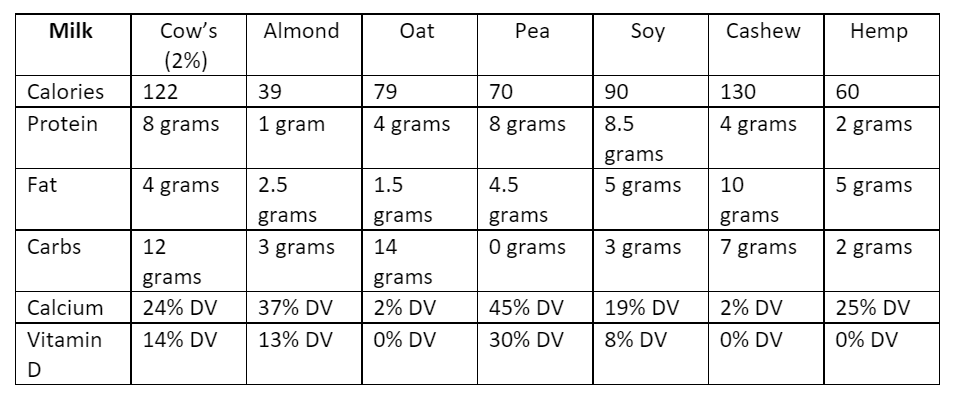Plant-Based vs. Cow’s Milk: What to Know
By Lizzie Streit, MS, RDN, LD
Plant-based “milks” are everywhere. From the original soy and almond milks to the newer oat and macadamia milks, there’s an option for anyone who wants or needs a substitute for cow’s milk.
People turn to plant-based milks for a variety of reasons. Maybe you are allergic or intolerant to cow’s milk, heard you should avoid dairy to lose weight, or prefer the taste of a certain milk over others. Others appreciate the shelf life of plant-based milks.
No matter the reason for your interest in plant-based milks, it’s important to know the nutrition, benefits, and downsides of plant-based and cow’s milk so that you can make an informed decision about the best option for you.
Nutrition of Different Milks
Cow’s milk is widely known as a good source of calcium. It also contains protein and carbohydrates in the form of lactose. It is almost always fortified with vitamin D and provides phosphorus, vitamins A and B12, riboflavin, and niacin. The nutrition of cow’s milk is very similar across all types (whole, 2%, skim), besides the difference in total grams of fat, and therefore calories, in each one.
Plant-based milks, on the other hand, have different nutritional profiles from cow’s milk and each other depending on the ingredients and brand. They are often fortified with nutrients that are found in cow’s milk (but may not have the same amounts) and may contain additives that prevent separation and improve shelf life. Some plant-based milks have added sugar and other flavorings.
Here’s a breakdown of the nutrition of cow’s milk vs. popular plant-based milks (all unsweetened) per one cup (1, 2, 3, 4, 5, 6, 7).
What to Consider
As you can see, the nutrition of plant-based milks varies widely and depends on the brand. When choosing the best milk for you, consider your nutrition goals and preferences in addition to the ingredients.
Here are some points to consider:
Protein: If you tolerate dairy, cow’s milk is a good option due to its higher protein content. Protein can keep you satiated between meals and is helpful for weight loss. Soy and pea milks usually contain the same amount of protein as cow’s milk but have fewer calories, especially compared to 2% or whole milk. Still, they may have added sugars and additives not found in cow’s milk.
Vitamin D and calcium: Cow’s milk naturally contains calcium and is fortified with vitamin D. Many plant-based options are also fortified with these nutrients, but it depends on the brand. If you rely on milk to meet your protein, calcium, and/or vitamin D needs but want to try something other than cow’s milk, soy or pea milk would be the best replacements. If you eat other foods with calcium and vitamin D and do not need dairy as a source of these nutrients, plant-based milks other than soy and pea may be good options.
Taste and texture: Plant-based milks do not perfectly match the taste of cow’s milk. Almond and cashew milks have mild, nutty undertones, while hemp milk has earthy hints and soy milk contains a subtle, soy-like aftertaste. Most plant-based milks are fairly creamy, but oat milk is the creamiest and tastes slightly sweeter than other options. Pea milk does not really taste like peas but is often described as having a chalky flavor. Consider your preferences when selecting a plant-based milk.
Shelf life: Cow’s milk usually lasts 4 to 7 days after opening in the fridge, but plant-based milks have the benefit of being shelf-stable at room temperature until you open them. They last up to 10 days in the fridge after opening.
Cost: Most plant-based milks cost more than cow’s milk. However, you can save some money by making plant milks at home. This requires soaking nuts or grains in water, draining them through a nut milk bag or cheese cloth, and/or blending them in a high-powered blender. You can add seasonings, like vanilla extract and cinnamon, to taste.
Additives and sweeteners: Many plant-based milks contain added sugars, flavorings, and thickening agents. Look for brands that have just a few ingredients, including the main ingredient (such as almonds or oats) and water. Avoid sweetened or artificially flavored options. When it comes to thickening agents, some are better than others. For example, lecithin, guar gum, and xanthan gum are generally considered safe, while carrageenan is thought to contribute to bloating and stomach inflammation.
Ethical and environmental considerations: Those who are concerned about the treatment of dairy cows or the environmental impacts of the dairy industry may prefer to choose plant-based milks. But there may also be environmental concerns pertaining to plant-based milks, such as the significant amount of water used to produce almonds or the reliance on genetically modified crops to grow soy.
There’s a lot to consider when it comes to choosing the best milk for you. But with so many options, you’re bound to find one that tastes great, provides you with nutrients, and fits with your preferences!
Note from Healthy For Life Meals: Save yourself the time and energy it takes to compare milks, and let us provide you with nutritionally balanced meals! Get started with one of our plans—traditional or vegetarian—today, and start your journey towards better health.


